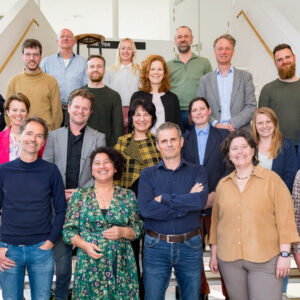Knowledge platform Circular Design launched

CIRCONNECT accelerates the transition to a circular economy
Knowledge institutions, industry associations, the design sector, regional accelerators and government organisations are joining forces in the new knowledge platform CIRCONNECT. They will make existing knowledge and experience in the field of circular design widely accessible and develop new knowledge together.
Increasing scarcity of raw materials and growing challenges around waste, nitrogen and CO2 emissions make the transition to a circular economy urgent. A circular economy is all about preserving value. To achieve this, products - from telephones to viaducts - need to be designed in a circular way from the outset. This way they can be easily shared, reused, repaired, remanufactured or ultimately recycled.
CIRCONNECT: Inspiring, connecting and catalysing
On Tuesday 29 March 2022, fourteen parties came together for the official launch of CIRCONNECT. TU Delft / Industrial Design Engineering, Amsterdam University of Applied Sciences, Zuyd University of Applied Sciences, Rijkswaterstaat, TNO, Dutch Designers' Association, CBM, Knowledge Institute for Sustainable Packaging, Federation NRK, Acceleration House Netherlands Circular, Oost NL, NICE, Province of Overijssel and CIRCO jointly underscore the ambition of CIRCONNECT:
"We join forces to continuously share, enrich and actively distribute our collective knowledge of circular design. With this knowledge, companies and designers can redesign their products and business models. Government and research institutions are also fed with this to optimize the preconditions for the transition."
To realize this ambition, by 2022 the parties will develop an online platform, knowledge events and various other knowledge propositions. The knowledge will be tailored to specific sectors and target groups. The fourteen participating parties are now taking the lead in developing CIRCONNECT as an inspiring, connecting and catalyzing hub in a network of cooperating organizations.
Circular design as a motor for raw materials transition
By 2050, the Dutch economy must have transformed from the current linear model to a sustainable circular system. In a circular economy, products retain their value longer and raw materials are reused again and again. Circular design is the driving force behind this. After all, a large part of the environmental impact of an end product is already determined in the design phase. A sustainable economy is only created by thinking about value retention and the recovery of raw materials during the design phase.
In recent years, much research and experience has been gained with circular design strategies and business models. In order to be fully circular by 2050, it is essential that this knowledge and experience be available to a wide audience. CIRCONNECT brings together experiences from various disciplines to make them accessible to designers, entrepreneurs, policy makers, research and education.
The importance of making circular design knowledge and information widely available and accessible cannot be stressed enough. I warmly welcome the CIRCONNECT initiative.
- Dr. Conny Bakker (Professor of Design Methodology for Sustainability and Circular Economy, TU Delft)